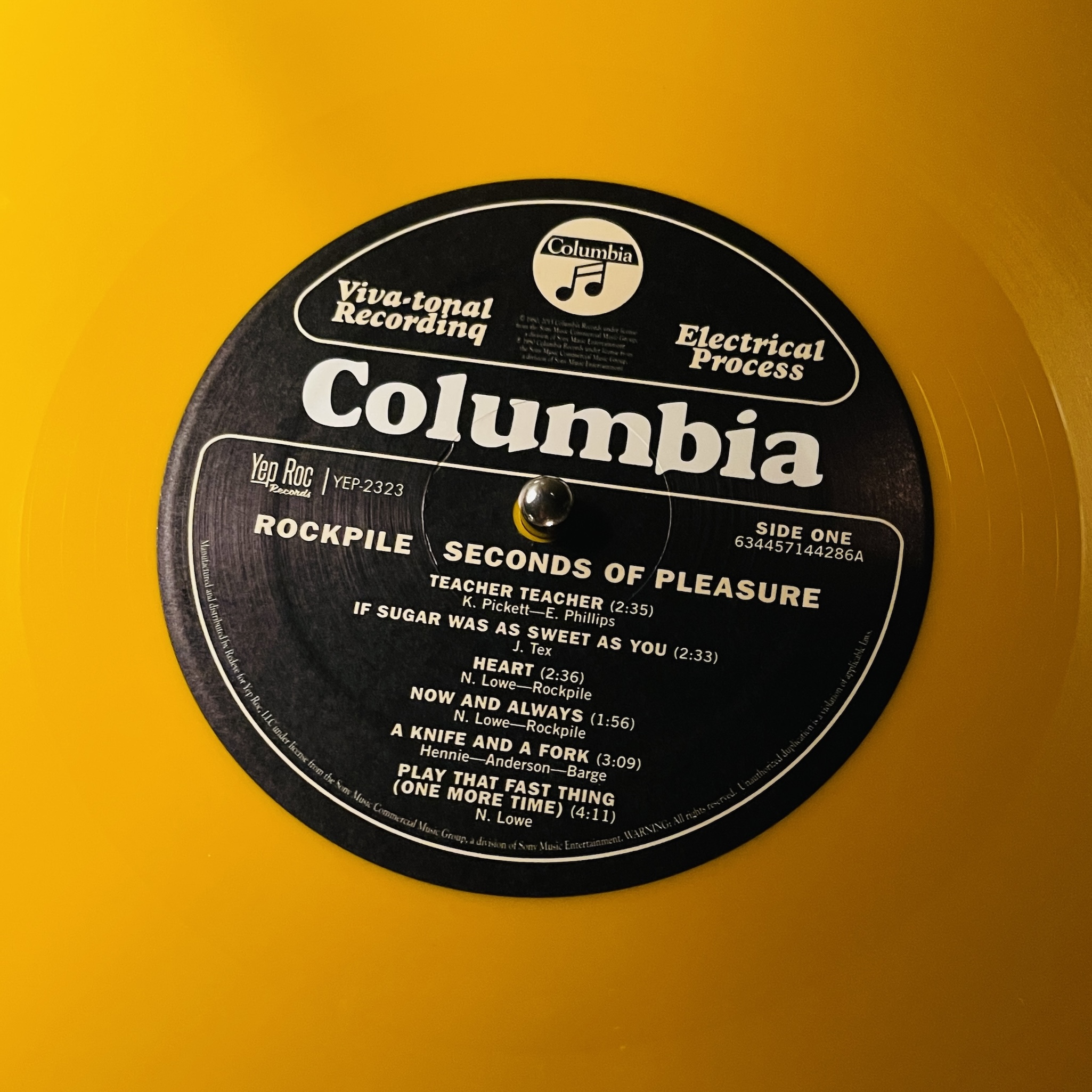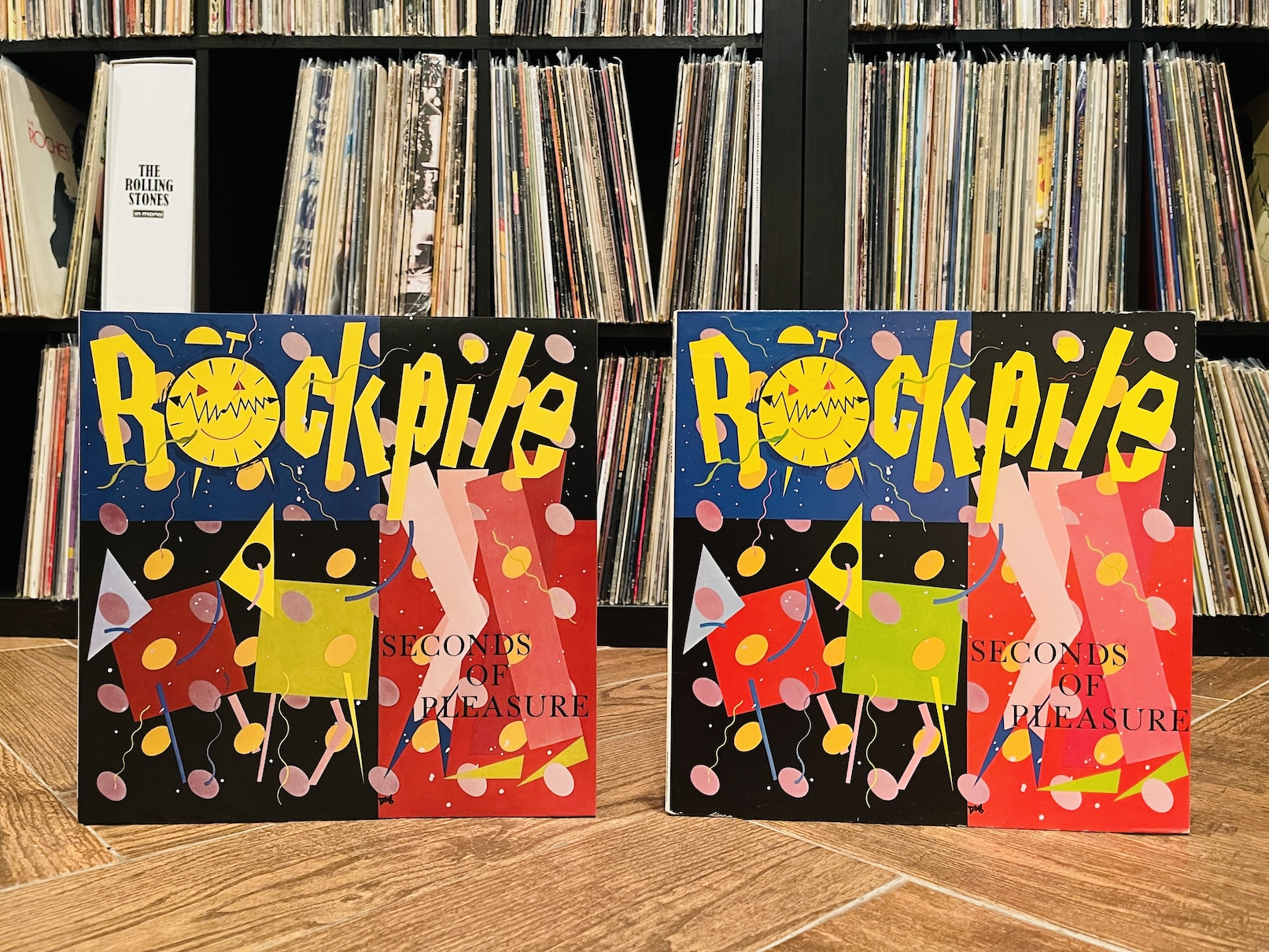"Seconds of Pleasure", Rockpile's Solo Release Reissued
A Timeless Throwback Pub Rock Classic
The sum - it’s said - is always greater than the parts. Rockpile may have only released one album, but 1980’s Seconds of Pleasure stands as a prime example of that adage. Nick Lowe (guitar, vocals) and Dave Edmunds (guitar, vocals) were the band's star power, but they brought more than just their entertainment acumen to the table; with them came their longtime musical cohorts Billy Bremner (vocals, guitar) and Terry Williams on “drums, drums, drums” (as the liner notes exclaim). Hook laden melodies coupled with a healthy respect for their rock ‘n’ roll forefathers made the music on Rockpile’s solo release both familiar and infectious - a compelling blend.
Though Seconds of Pleasure is the only studio album to bear their name, Rockpile were not strangers to the stage or studio. As groundfloor members of the pub rock scene, the band spent hours woodshedding their skills seeking to proudly proselytize the rock and roll scriptures written by their rock and roll ancestors. Audiences during the mid-70s - especially those disaffected by the day’s emphasis on glam and prog - enjoyed this throwback approach. While the careers of Nick Lowe and Dave Edmunds branched off into successful directions, the group - as session musicians - served as the backup band for Lowe, Edmunds and a few other acts, as well.
Kevin Gray at Cohearant Audio cut new lacquers for the album and a mere 1,000 copies of this limited new release were pressed at Citizen Vinyl in Asheville, NC. This version’s yellow vinyl compliments Barney Bubbles’ eye-catching cover design. Bubble’s creations should be familiar to you as he crafted the album jackets of many U.K. groups during the late 70s and 80s. You know how the artwork for Elvis Costello’s This Year’s Model seems misaligned? Caught your attention, right? That was Barney’s contribution!
“Leave them wanting more” well describes the songs on Seconds of Pleasure. The album’s tracklist primarily consists of rock ‘n roll deep cuts and covers coupled with originals penned by Nick Lowe and the band. “Teacher Teacher” is the record's lead off track, and it is a strong one ensuring there will be no lifting the needle off of the record. Razor sharp harmonies slash away at the song’s chorus and punctuate the tune’s gallop; it’s done so well that one might imagine Buddy Holly grinning from beyond. You’ll wonder how the record’s takes were committed to tape with such solid acuity, but - considering the 10,000+ hours that the group had invested in sweat equity under hot stage lights - you’ll understand; when Rockpile arrived at Eden Studios in Chiswick, UK, they were warmed up, in their prime and ready, Teddy.
Nick Lowe’s inimitable bass playing is fueled with delirious energy and wiry nervousness especially on “If Sugar Was as Sweet as You” (a Joe Tex penned number). Here, lead vocals by Dave Edmunds’ are in just the right tenor range to push the envelope and the double-tracked vocals are captured with surgical precision.
The album’s third main vocalist - Billy Bremner - provides a first class ticket to Motown via “Heart” (a Lowe and Co. original) which bristles with buoyant optimism. Billy’s other lead vocal is heard on the album’s final track, “You Ain’t Nothin’ but Fine,” originally released by Rockin’ Sidney as a Cajun, Zydeco, rock ‘n roll hybrid in 1961.
The album’s first few tracks hint at the specter of the Everly Brothers, but on “Now and Always” Lowe and Edmunds fully embrace the sound with such commitment that you’d swear they were related. But it’s more than just the blood harmony, the compositional structure is a late 50s meld of major and minor chords that offer a successfully heart-wrenching and bittersweet melody. Lead guitar parts weep with harmonic richness and support the song’s aesthetic.
While the Rockpile personnel had plenty of know-how at getting folks onto the dancefloor, on “Now and Always” the arrangement, musicianship, mixing, and production of the song give it the qualities it needs to surpass a straight-forward live presentation. In this regard, “Now and Always” successfully becomes a classic track. The song doesn’t need a cherry on top, but the arpeggiating rhythm guitar part toward the song’s end adds it free of charge anyway. All this in 1:58.
Further examination of those infectious Everly Brothers harmonies take place on a “free EP” titled Nick Lowe and Dave Edmunds Sing the Everly Brothers, this 7” 45rpm bonus disc was included with original pressings of the album. Unfortunately, the new reissue does not include those four tracks as doing so would have required expanding the release to a double album. It might have been nice to tack on a few live tracks too, but clearly that was not to be the case. Most digital streaming services tack the extra tunes onto the album’s tracklist.
 Edmund’s tackles “Knife and Fork,” a bizarre tune in which the song's narrator chastises his lady friend for eating too much, only proving that political correctness in 1980 wasn’t what it is today. Feeling like a leftover from the 70s, one can theorize that Edmunds might have planned for the tune to be a hit in the vein of his remake of “I Hear You Knocking” from a decade earlier. The song reminds me of the Kinks’ Everybody’s in Showbiz album from 1972 which featured at least four songs about over - and under - eating. If you’re writing about food, maybe just…don’t.
Edmund’s tackles “Knife and Fork,” a bizarre tune in which the song's narrator chastises his lady friend for eating too much, only proving that political correctness in 1980 wasn’t what it is today. Feeling like a leftover from the 70s, one can theorize that Edmunds might have planned for the tune to be a hit in the vein of his remake of “I Hear You Knocking” from a decade earlier. The song reminds me of the Kinks’ Everybody’s in Showbiz album from 1972 which featured at least four songs about over - and under - eating. If you’re writing about food, maybe just…don’t.
The pub rock party continues with Lowe’s “Play That Fast Thing (One More Time)” which will fill your listening space with the excitement of a late-night barroom north of Regents Park in London. Covered on the album, too, is Chuck Berry’s “Oh What a Thrill'' - pulled from his Rockit album released a year earlier in 1979. Though it’s a song from later in his career, it is still an homage to one of rock ‘n roll’s greatest architects. This version deviates from Chuck’s original which featured piano as the predominant instrument. The cover songs chosen for this project underscore the deep musical history that the band members were experts in; it’s fun to imagine the guys holding conversations in the studio about what numbers to include and why.
There are a few song choice surprises as well which make for an interesting listening session. One such selection is “Wrong Again (Let’s Face It)” written by Difford and Tilbrook of Squeeze. A curious track, the infusion of Squeeze's angular new wave style into David Edmunds’ rockabilly sensibilities serve up a pleasing intermezzo with which to begin side B.
“When I Write the Book” - another original - is a satisfying Nick Lowe number, perhaps one of the strongest tracks on the album. It also brings to mind “Everyday I Write the Book” from his chum, Elvis Costello, a song which became EC’s first Top 40 hit in the U.S. Elvis, in fact, credits Lowe’s song as an inspiration. Even further, Rockpile’s album title, Seconds of Pleasure was also the title of an unreleased song that Costello had written and demoed around the time of 1982’s Imperial Bedroom album.
Fortunately, my collection includes a minty version of an original U.S. pressing of Seconds of Pleasure with which to compare this new release with. The original pressing sounds very good and - in fact - is quite close to my impressions of the new version. Bass is prominent in the original copy, but it’s a touch undefined, woofy. Electric guitars have a raw edge, but get lost in the album’s somewhat shallow soundstage. My 43 year old Terre Haute pressing is very quiet (The U.K. original, which features the EP tucked into a front cover insert, smokes the American original_ed).
On this reissue, listeners will find excellent instrumental separation and a wider soundstage with more depth. Acoustic guitars have plenty of chugging power and string definition. Lowe’s bass has more finesse providing a compelling visual of the instrument rather than the approximation that the original pressing presents. Williams’ kick drum is rounder - more present - and the interplay between bass drum and snare is well aligned. High frequencies exhibit an appropriate tweak. Bravo to Citizen Vinyl for an exceptionally quiet disc.
 Which is which?
Which is which?
The original is more representative of a veteran band bringing their stage act to the studio: lead vocals exhibit a touch of grain and the band’s energy is just a smidge more frenetic with a display of midrange nudge. Gray’s new cut demonstrates an enticing cohesion, smoothing out the edges of the original. Still, both pressings sound very close to one another, almost as close as those Everly harmonies.
It’s a true pleasure to listen to and enjoy Seconds of Pleasure regardless of format. The new reissue will no doubt sound impressive on your favorite hifi, but the music that Nick, Dave and the boys created - and the expertise that is wholly evident in their playing - will provide inspiration no matter what speaker the album comes out of. Rockpile’s record is reminiscent of the music you’ve heard on a ratty car stereo during a late night drive or an old cassette player echoing from a nearby garage on a hot summer afternoon. The music and performance are so enjoyable, it doesn’t matter if it sounds good. Fortunately, Rockpile’s Seconds of Pleasure sounds even better now than it did back then.



.jpg)





































.png)








